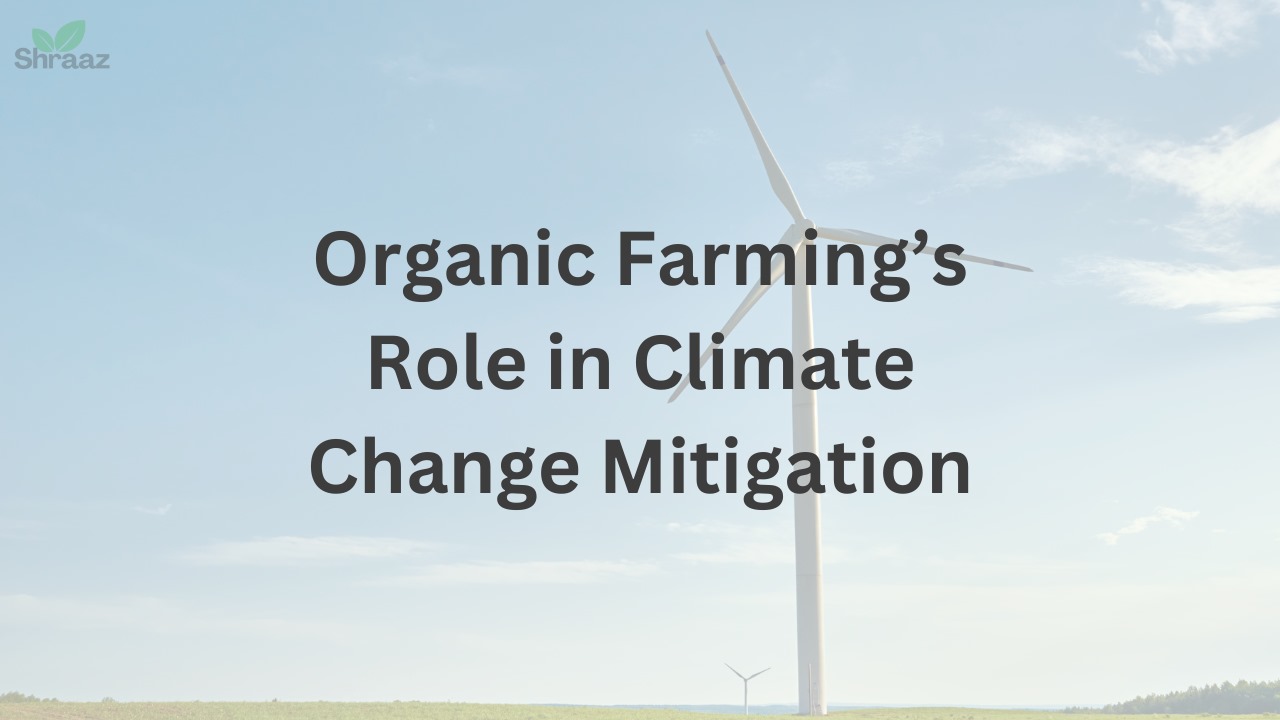Introduction
Climate change, one of the most pressing challenges of our time, is closely linked to human activities, with agriculture being a major contributor to greenhouse gas (GHG) emissions. Conventional farming practices, which rely heavily on synthetic fertilizers, pesticides, and large-scale industrial farming methods, are known to exacerbate environmental degradation and contribute to global warming. As we seek sustainable solutions, organic farming has emerged as a potential pathway to mitigate climate change by reducing emissions, improving soil health, and promoting biodiversity. This article explores the critical role of organic farming in addressing climate change, highlighting how it differs from conventional farming and its potential to contribute to long-term environmental sustainability.
For a broader discussion of the overall organic farming beyond just it’s role in climate change, check out Organic vs. Inorganic Farming: A Comprehensive Comparison.
The Relationship Between Agriculture and Climate Change
Agriculture plays a dual role in the climate change narrative: it is both a contributor to the problem and a potential solution. On the one hand, conventional farming is responsible for around 24% of global GHG emissions, primarily from activities such as deforestation, land-use change, livestock production, and the use of synthetic fertilizers.
Key areas where agriculture contributes to climate change:
- Deforestation: The conversion of forests to agricultural land releases large amounts of carbon stored in trees and soils.
- Synthetic Fertilizers: Nitrogen-based fertilizers release nitrous oxide, a potent greenhouse gas.
- Livestock Production: Cattle and other ruminants produce methane, another powerful GHG, through enteric fermentation.
- Fossil Fuel Usage: The mechanization of agriculture and transportation of produce require significant fossil fuel energy.
Organic farming offers a sustainable alternative by focusing on natural processes and minimizing harmful inputs. By promoting healthy ecosystems, organic farming has the potential to address climate change at its root while supporting food security.
What is Organic Farming?
Organic farming is a system of agricultural production that emphasizes ecological balance, biodiversity, and sustainability. It avoids the use of synthetic chemicals like fertilizers and pesticides, instead relying on natural methods to maintain soil fertility and pest control. Organic farms implement practices such as crop rotation, composting, and biological pest management to achieve a more sustainable agricultural model.
Key Principles of Organic Farming:
- No Synthetic Inputs: Organic farms use natural fertilizers (e.g., compost, green manure) and biological pest control methods.
- Crop Rotation: By rotating crops, organic farmers prevent soil depletion and reduce the risk of pests and diseases.
- Animal Welfare: Organic farming prioritizes animal health by avoiding the use of antibiotics and growth hormones.
- Biodiversity: Organic systems encourage a diverse range of crops, animals, and wildlife, contributing to a more resilient ecosystem.
Comparison of Organic and Conventional Farming:
| Aspect | Organic Farming | Conventional Farming |
| Fertilizer | Natural (compost, manure, cover crops) | Synthetic (nitrogen, phosphorus-based) |
| Pesticides | Biological and mechanical controls | Chemical pesticides |
| Soil Health | Emphasizes soil building and biodiversity | Soil often depleted by monocropping |
| Energy Use | Lower, promotes renewable energy | High, relies on fossil fuels |
| Greenhouse Gas Emissions | Lower emissions due to sustainable practices | High emissions from synthetic inputs |
Organic Farming and Soil Health
Healthy soils are crucial for agriculture and the broader ecosystem, and they play a critical role in carbon sequestration — the process of capturing and storing atmospheric carbon dioxide. Organic farming enhances soil health by focusing on practices that build organic matter and improve soil structure. Techniques such as composting, mulching, and the use of cover crops improve soil fertility, prevent erosion, and enhance water retention, making farmland more resilient to the effects of climate change.
Soil Carbon Sequestration:
Organic farming increases soil organic carbon (SOC) levels, which helps in removing carbon from the atmosphere. Research shows that organically managed soils can sequester more carbon compared to conventionally managed soils, reducing net GHG emissions.
Benefits of Healthy Soils in Organic Farming:
- Improved Carbon Sequestration: Organic matter binds carbon in the soil, reducing atmospheric CO2 levels.
- Enhanced Water Retention: Healthy soils retain more water, making them less vulnerable to drought and flood cycles caused by climate change.
- Resilience to Climate Extremes: Soils with high organic content are more resistant to erosion, nutrient loss, and compaction, helping crops survive extreme weather conditions.
Organic Farming’s Contribution to Reducing Greenhouse Gas Emissions
Organic farming can reduce GHG emissions across several dimensions of agricultural production. One of the key differences between organic and conventional farming is the limited use of synthetic nitrogen fertilizers in organic systems, which are a major source of nitrous oxide emissions.
Reduction of GHG Emissions:
- Lower Nitrous Oxide Emissions: By avoiding synthetic fertilizers, organic farming reduces nitrous oxide emissions, a gas 298 times more potent than CO2.
- Methane Reduction in Livestock: Organic livestock management practices reduce methane emissions through better grazing practices, diet adjustments, and improved manure management.
- Carbon Sequestration: Organic farming methods, such as agroforestry and cover cropping, contribute to higher carbon sequestration rates than conventional methods.
- Reduced Fossil Fuel Use: Organic farms often use less mechanization and favor manual labor, which lowers their reliance on fossil fuels.
Data Supporting Organic Farming’s Climate Benefits:
A meta-analysis comparing organic and conventional farming found that organic farms emit 20% fewer greenhouse gasses per hectare. However, these reductions can vary based on the type of crop and geographical location.
Biodiversity and Ecosystem Services
Biodiversity is critical for maintaining healthy ecosystems and promoting resilience to climate change. Organic farms support greater biodiversity compared to conventional farms, which often rely on monocropping and synthetic inputs that harm wildlife and insects. The diverse ecosystems on organic farms promote natural pest control, pollination, and soil fertility, reducing the need for external inputs.
Key Ecosystem Services Provided by Organic Farming:
- Natural Pest Control: Biodiversity in organic farms promotes a balance of predators and prey, reducing pest outbreaks.
- Pollination: Organic farms attract a wider variety of pollinators, such as bees and butterflies, which are essential for crop yields.
- Habitat for Wildlife: Organic farms serve as habitats for various species of birds, mammals, and insects, which contribute to ecosystem health.
Organic farms often use buffer zones with trees and shrubs, which provide shelter and food for pollinators and other beneficial species, further enhancing biodiversity.
Water Management in Organic Farming
Water is a critical resource in agriculture, and its scarcity is becoming a growing concern due to climate change. Organic farming emphasizes practices that improve water retention and minimize water wastage, making it more sustainable in the face of droughts and water shortages. Unlike conventional farming, which often relies on intensive irrigation and synthetic chemicals that can lead to water pollution, organic farming promotes natural water management techniques.
Organic Water Management Techniques:
- Mulching: By covering the soil with organic materials (e.g., straw, leaves), organic farmers reduce water evaporation and maintain soil moisture.
- Cover Crops: These crops are planted to cover the soil during off-seasons, preventing erosion and improving water retention.
- Organic Matter in Soil: Soils rich in organic matter retain water more effectively, reducing the need for irrigation.
- Efficient Irrigation: Organic farming often incorporates low-water irrigation systems like drip irrigation, which delivers water directly to plant roots, minimizing wastage.
Benefits of Organic Water Management:
- Reduced Water Runoff: Organic farming prevents soil erosion, allowing more water to infiltrate and be stored in the soil.
- Lower Risk of Water Pollution: Since organic farms don’t use synthetic pesticides and fertilizers, there is less risk of these chemicals contaminating water sources.
- Drought Resilience: Organic farms tend to be more resilient during droughts because of the increased water retention in organic soils.
Research indicates that organic farms can use 15-20% less water compared to conventional farms due to these sustainable practices, making organic agriculture a valuable tool in water conservation efforts.
Energy Use in Organic vs. Conventional Farming
Agriculture is energy-intensive, and conventional farming often depends on fossil fuels for machinery, transportation, and the production of synthetic fertilizers and pesticides. Organic farming, however, tends to have lower energy inputs, especially regarding the production and application of agrochemicals.
Key Differences in Energy Use:
- Fertilizer Production: The manufacture of synthetic fertilizers is highly energy-intensive. Organic farming avoids this by using compost, manure, and other natural inputs, which require far less energy to produce.
- Pesticide Application: Organic farms use biological pest control, which requires less energy compared to the production and application of chemical pesticides in conventional farming.
- Mechanization: While organic farms may still use machinery, they often rely more on manual labor or energy-efficient equipment, leading to lower overall energy consumption.
Energy Efficiency in Organic Farming:
Organic systems can reduce energy use by as much as 30-50% compared to conventional farming. This reduction is especially significant in crop production, where energy savings are achieved through less reliance on synthetic inputs and more efficient use of renewable energy sources.
A comparison of energy use per hectare between organic and conventional farming reveals that:
- Organic crop production: Uses 25-35% less energy.
- Conventional livestock farming: Relies on high-energy feed production, whereas organic livestock systems often use local, sustainable feed sources, reducing energy use.
By using less fossil fuel-based energy, organic farming contributes to lower GHG emissions, making it a more climate-friendly option.
Challenges and Limitations of Organic Farming in Climate Change Mitigation
While organic farming offers many environmental benefits, it also faces certain challenges and limitations, particularly in the context of scaling up to meet global food demand and mitigating climate change. These challenges must be addressed to maximize organic farming’s potential for climate change mitigation.
Key Challenges:
- Lower Yields: Organic farming often produces lower yields compared to conventional farming, particularly in the short term. This can lead to the need for more land to produce the same amount of food, which could negate some of the climate benefits of organic agriculture.
- Transition Period: Farmers transitioning from conventional to organic systems may face a period of lower productivity and higher costs, as the soil adjusts and synthetic inputs are phased out.
- Labor Intensity: Organic farming tends to require more labor, which can increase costs and reduce scalability, especially in regions where labor is expensive or scarce.
- Limited Access to Organic Inputs: In some regions, organic inputs (e.g., organic seeds, compost) may not be readily available or may be more expensive than conventional inputs.
- Climate Resilience: While organic farming is generally more resilient to climate variability, extreme weather events, such as floods and droughts, can still have a significant impact on organic yields.
Overcoming the Challenges:
Despite these challenges, innovations in organic farming practices and policy support can help overcome these limitations. For example, improving organic seed varieties and developing more efficient organic pest control methods can help increase yields and reduce labor requirements.
Case Studies: Organic Farming Success Stories in Climate Mitigation
Around the world, organic farming has demonstrated its potential to contribute to climate change mitigation through real-world examples. These case studies highlight how organic practices can improve soil health, reduce GHG emissions, and enhance resilience to climate change.
Case Study 1: Organic Farming in India
In India, organic farming has become a key part of the government’s efforts to promote sustainable agriculture and combat climate change. Organic farms in the state of Sikkim, which became the world’s first fully organic state in 2016, have reported increased biodiversity, improved soil health, and lower carbon emissions. By banning synthetic chemicals, Sikkim has also reduced its reliance on fossil fuels and improved water conservation.
Case Study 2: Organic Dairy Farming in Denmark
Denmark’s organic dairy sector has led the way in climate-friendly livestock farming. Organic dairy farms in the country have adopted rotational grazing, which enhances soil carbon sequestration and reduces methane emissions from cattle. In addition, organic farms in Denmark use renewable energy sources, such as solar power and wind, to reduce their carbon footprint.
Case Study 3: Organic Crop Production in the United States
In California, organic vegetable farms have successfully reduced water use and improved soil carbon levels through the use of cover crops, composting, and efficient irrigation techniques. These farms have also reported higher resilience to droughts, a crucial factor as climate change exacerbates water shortages in the region.
These case studies demonstrate that organic farming can be a viable solution to climate change, offering both environmental and economic benefits.
Global Policies Supporting Organic Farming for Climate Change Mitigation
Governments and international organizations are increasingly recognizing the role of organic farming in climate change mitigation. Policies aimed at promoting organic agriculture can help accelerate its adoption and provide farmers with the tools and resources they need to make the transition.
Key Policy Initiatives:
- European Union Green Deal: The EU’s Green Deal includes a commitment to expanding organic farming, with a target to have 25% of EU agricultural land under organic management by 2030.
- India’s National Organic Farming Policy: India’s policy framework encourages the adoption of organic practices, particularly in regions vulnerable to climate change.
- United Nations Sustainable Development Goals (SDGs): The UN’s SDGs promote sustainable agriculture, including organic farming, as a means of achieving climate resilience and reducing environmental degradation.
These policies are essential in providing financial incentives, technical support, and regulatory frameworks that encourage the adoption of organic farming practices.
Transitioning to Organic Farming: A Climate Change Strategy
Transitioning to organic farming is a critical strategy for mitigating climate change. However, it requires careful planning, investment, and support to ensure that farmers can successfully shift from conventional to organic practices without compromising food security or livelihoods.
Steps for Transitioning:
- Soil Health Management: Farmers need to focus on improving soil health through organic inputs, crop rotation, and cover cropping.
- Pest and Disease Control: Organic farms must adopt biological pest management techniques to reduce reliance on synthetic pesticides.
- Market Access: Governments and businesses should work to create strong markets for organic produce, ensuring farmers have access to buyers willing to pay for sustainably grown food.
- Financial and Technical Support: Farmers need financial incentives and technical training to successfully transition to organic farming, particularly in the early years when yields may be lower.
Economic Benefits of Organic Farming in the Context of Climate Mitigation
While the environmental benefits of organic farming are widely acknowledged, the economic advantages are also significant, especially when considering long-term sustainability and climate change mitigation. Organic farming can offer financial rewards to farmers through premium prices, reduced input costs, and market incentives. These economic benefits contribute to the viability of organic farming as a solution for mitigating climate change.
Key Economic Benefits:
- Premium Prices: Organic produce generally sells at a higher price compared to conventionally grown food. This premium can offset lower yields and higher labor costs, making organic farming profitable for farmers.
- Reduced Input Costs: Organic farming eliminates the need for costly synthetic fertilizers and pesticides, significantly reducing the expenses associated with these inputs. Farmers can use natural alternatives like compost and manure, which are often less expensive and locally available.
- Long-term Soil Health: Healthier soils in organic systems require fewer inputs over time, further reducing costs. Organic soils with higher fertility and water retention reduce the need for irrigation and synthetic inputs, leading to long-term financial savings.
- Subsidies and Incentives: Many governments offer financial incentives for farmers who adopt organic practices. These subsidies can help ease the transition to organic farming and support farmers in the initial years when yields may be lower.
Organic Farming’s Market Potential:
The global organic food market has grown steadily in recent years, driven by consumer demand for environmentally friendly, healthier products. As consumers become more aware of the impact of agriculture on climate change, the demand for organic products is likely to increase, offering farmers a profitable opportunity in this sector.
Table: Economic Benefits Comparison: Organic vs. Conventional Farming
| Benefit | Organic Farming | Conventional Farming |
| Premium Product Pricing | Yes, higher due to organic certification | No premium for conventional produce |
| Input Costs | Lower (no synthetic inputs) | Higher (fertilizers, pesticides) |
| Long-term Soil Health | Improved, reducing long-term costs | Degraded, leading to higher input costs |
| Market Growth | Increasing demand globally | Stable, but no major growth trends |
The financial benefits, coupled with environmental advantages, make organic farming a viable strategy for farmers looking to contribute to climate change mitigation while sustaining their livelihoods.
The Future of Organic Farming in a Changing Climate
As the world continues to face the impacts of climate change, the future of agriculture will increasingly depend on sustainable practices. Organic farming is positioned as a key player in the global shift towards climate-resilient food systems. However, its future success will depend on overcoming challenges such as scalability, productivity, and accessibility.
Trends Shaping the Future of Organic Farming:
- Technological Innovations: New technologies, such as organic-compatible pest management solutions and precision agriculture, are helping to increase the efficiency and productivity of organic farming without compromising its sustainability.
- Climate-Resilient Crops: Research and development into drought-resistant and climate-adaptive organic crops are vital for ensuring the viability of organic farming in regions facing extreme weather conditions.
- Increased Policy Support: Governments are likely to increase their support for organic farming through climate policies, subsidies, and investment in research. International commitments to reduce carbon footprints will further drive the growth of organic farming.
- Consumer Demand: As more people become aware of the link between food production and climate change, the demand for organic products is expected to grow, influencing farming practices and supply chains globally.
The Role of Organic Farming in a Sustainable Future:
Organic farming has the potential to lead the shift towards sustainable food systems that are both climate-resilient and environmentally friendly. As the agricultural sector seeks to reduce its greenhouse gas emissions and adapt to climate change, organic farming will be an important tool in achieving these goals.
Conclusion
Organic farming plays a critical role in mitigating climate change through its sustainable practices that focus on improving soil health, reducing greenhouse gas emissions, and conserving water. By avoiding synthetic fertilizers and pesticides, organic farming not only promotes biodiversity and ecosystem services but also reduces energy consumption, particularly the reliance on fossil fuels. Its emphasis on soil carbon sequestration, water retention, and the use of renewable energy sources makes it a powerful tool for climate action.
While organic farming faces challenges, such as lower yields and labor intensity, its long-term economic benefits, market potential, and environmental advantages make it a viable solution for climate change mitigation. Global policies and consumer demand for organic products are driving the expansion of organic farming, and with continued innovation and investment, it has the potential to play a leading role in the future of sustainable agriculture.
Ultimately, transitioning to organic farming is not only a necessary strategy for addressing climate change but also an opportunity to create resilient, productive, and profitable agricultural systems for future generations.





[…] Healthy soil is the foundation of organic farming. By avoiding synthetic chemicals and focusing on composting, green manure, and crop rotation, organic farmers maintain and improve soil fertility. This also helps to sequester carbon, making organic farming a more sustainable option in the fight against climate change. […]
[…] Soil Health: Organic farming enhances soil structure, promotes water retention, and increases organic matter content. The use of compost, green manure, and crop rotation fosters a thriving soil ecosystem, reducing the risk of erosion. According to the Rodale Institute, organic farming increases soil carbon sequestration, which plays a role in mitigating climate change. […]
[…] Carbon sequestration: Organic farming increases soil carbon storage by building organic matter, helping to mitigate climate change. […]
[…] ecological balance, organic farming helps preserve natural resources, protect biodiversity, and mitigate climate change. This section explores the various environmental advantages of organic farming, supported by facts […]